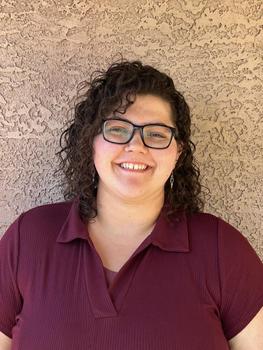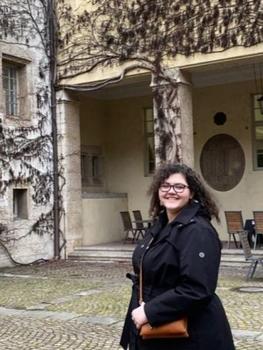Merisa Mattix strives to guide students as an Honors 110 professor
Having spent 5 semesters as a peer mentor, Merisa Mattix continues her passion in guiding Honors College students at George Mason University by teaching Honors 110: Methods of Research and Inquiry. Mattix was drawn to George Mason's Jimmy and Rosalynn Carter School for Peace and Conflict Resolution for it's emphasis on understanding the multiple perspectives involved in conflicts. As an Honors College student, Mattix was selected as among the most motivated applicants to George Mason to receive enhanced academic and social opportunities to shape her into a leader in her career and community.

Jeffrey Zitomer: Where are you from?
Merisa Mattix: I’m from Phoenix, Arizona. I’m the only family member to move more than two hours away. I’m also half Canadian; my mother is from Saskatchewan, Canada. I do identify a lot with being from the Southwest, though. There’s a distinct culture there that’s very different from Northern Virginia. And I miss authentic Mexican food!
Jeffrey: What are you passionate about?
Merisa: I love mentoring students and helping them get where they want to be! Other than that, I love the fact that I can get to D.C. or Shenandoah National Park within an hour. I can choose nature or the city. I also enjoy doing solo hikes or going to concerts by myself. Since I’m not attached to anyone, I’m not worried about my friends and their experiences – instead I’m part of the whole, collective experience. My musical tastes are mostly folk or indie, but I’ve been into jazz-pop lately, specifically Sammy Rae and the Friends.
Jeffrey: Why did you choose the Carter School?
Merisa: I started out in Global Affairs, and I found it was taught through a U.S.-centric lens. However, when I took Conflict 101: Conflict and Our World, the professor taught through multiple different perspectives, and they were all taught as equally valid. I had already believed that you can’t make sustainable change if you’re only acknowledging one side of a story, so I thought I’d be better equipped to make the social changes I wanted to see if I switched to the Carter School. At that time, I was particularly interested in preventing human trafficking, but that has grown to encompass violence prevention in a broader definition.
Jeffrey: What was your favorite course at the Carter School, so far?
Merisa: I have a favorite for my undergraduate and my master’s experience.
My favorite undergraduate course was Conflict 210: Theories of Conflict Analysis and Resolution. The professor really sparked my interest in philosophy combined with practical methodology. He was also the first to introduce me to critical theory, which encourages you to question everything you think you know. And that’s just fun!
My favorite class in the master’s program was a practical skills course. It was part of a grant program that brought undergraduate students from Georgia, Armenia, and Azerbaijan to learn conflict resolution skills from Carter School master’s students. Over the two weeks they were here, I bonded with the students and was able to take them on a day trip to New York. I’m still connected with many of those students.
Jeffrey: How did the Honors College prepare you for your success at George Mason?
Merisa: The best thing about the curriculum at the Honors College is that it starts with an individual research project. The training to think creatively and critically to find a project that hadn’t been done before sets you up for all of your other classes and to pursue research interests for the rest of your undergraduate experience. I seamlessly transitioned into the research courses at the Carter School as well as my capstone project, which was on non-profits’ response to political polarization in the U.S.
Jeffrey: What was your most impactful experience doing undergraduate research?

Merisa: I did an undergraduate research scholars project through OSCAR studying political polarization in churches in Lake Charles, Louisiana. The project was emotionally difficult and hit close to home, but the interviews I had with people working to heal their communities gave me renewed hope.
Jeffrey: What was it like to teach a course that you took as an undergraduate student?
Merisa: I took Honors 110: Principles of Research and Inquiry as a first-semester freshman in the Honors College. It was in this class that do your own, independent research project. Later, as an upperclassman, I became a peer mentor, providing assistance and guidance for new students taking the course. Five semesters of peer mentoring later, I graduated with my BA. Now, I’m the only master’s student teaching Honors 110: Principles of Research and Inquiry. I know the curriculum like the back of my hand, at this point! Honestly, I love learning about the vast variety of ideas that students come up with and helping them pursue their interests.
Jeffrey: Ideally, what would you like to do, post-graduation?
Merisa: I want to work in non-profits for, maybe 5-10 years to gain practical experience – and to be out of school for the first time since I was four-years-old – and then return to earn my PhD.
Jeffrey: Do you have a message for anyone considering George Mason?
Merisa: The most beautiful thing about George Mason is its diversity, including its diversity of thought. It’s also a “sleeping giant,” in that most students don’t realize how prestigious most of our colleges really are.
